Churches and chapels of Gotland
| Name | Main construction period | Coordinates | Image | Notes | References |
|---|---|---|---|---|---|
| Gnisvärd Chapel | 1839 | 57°30′26″N18°06′44″E / 57.50722°N 18.11222°E |  | [1] | |
| Gotska Sandön Chapel | 58°23′19.3″N19°11′47.5″E / 58.388694°N 19.196528°E |  | |||
| Hallshuk Chapel | 57°55′30″N18°44′33″E / 57.9250°N 18.7424°E |  | |||
| Kovik Chapel | 1963 | 57°24′33″N18°09′53″E / 57.40917°N 18.16472°E |  | ||
| Pentecostal Church of Visby | 1988 | 57°37′39″N18°18′09″E / 57.62750°N 18.30250°E |  | The church belongs to the Swedish Pentecostal Movement. It has been in use since 1988. | [2] |
| Slite Church | 1960 | 57°42′26″N18°47′45″E / 57.70722°N 18.79583°E |  | The church was designed by the Danish architect Holger Jensen and built 1959–1960. It is built using only local materials. It has sculptures made by a local artist, Bertil Nyström. | |
| Terra Nova Church | 57°36′48.26″N18°18′41.47″E / 57.6134056°N 18.3115194°E |  | The church dates from 1983 and was designed by architect Hans Wieland. It was inaugurated by Bishop Tore Furberg . | [3] | |
| Vibble Chapel | 57°36′02.3″N18°14′59.3″E / 57.600639°N 18.249806°E |  | |||
| Visborg Church | 1969 | 57°37′28″N18°17′06″E / 57.62444°N 18.28500°E |  | Visborg Church was built in 1969, to designs by architect Per Erik Nilsson. | |
| Visby Catholic Church | 1982 | 57°38′31″N18°17′43″E / 57.64194°N 18.29528°E |  | The church, which was inaugurated by Bishop Hubertus Brandenburg in 1982, it is the first Catholic church to be built on Gotland since the Middle Ages. It lies in the centre of Visby. | [4] |
| Vårdklockan Church | 1875 | 57°38′18″N18°17′44″E / 57.63833°N 18.29556°E |  | Belonging to the Uniting Church in Sweden | [5] |
Related Research Articles
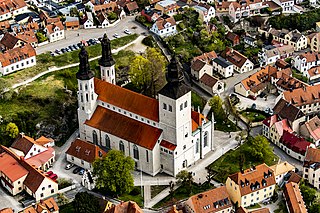
Visby is an urban area in Sweden and the seat of Gotland Municipality in Gotland County on the island of Gotland with 24,330 inhabitants as of 2017. Visby is also the episcopal see for the Diocese of Visby. The Hanseatic city of Visby is arguably the best-preserved medieval city in Scandinavia, and, since 1995, it has been on the UNESCO World Heritage Site list. Among the most notable historical remains are the 3.4 km (2.1 mi) long town wall that encircles the town center, and a number of church ruins. The decline as a Hanseatic city in the Late Middle Ages was the cause for many stone houses being preserved in their original medieval style.

Fole is a populated area, a socken, on the Swedish island of Gotland. It comprises the same area as the administrative Fole District, established on 1 January 2016.

Bunge Church is a medieval church in Bunge on the Swedish island of Gotland. The church seen today was largely built during the 14th century and is in a High Gothic style typical for churches on Gotland. Inside, the church is richly decorated with medieval murals, including depictions of medieval knights whose significance remain contested. Bunge Church belongs to the Church of Sweden and lies in the Diocese of Visby (Sweden).

Hejdeby Church is a medieval church in Hejdeby on the Swedish island of Gotland. The church was built in stages during the 13th century, and contains medieval murals from two different periods. Hejdeby Church is part of the Diocese of Visby within the Church of Sweden.

Ala Church is a medieval church in Ala on the Swedish island of Gotland. Its oldest parts date from the 12th century. Damaged by fire in the 1930s, it still contains medieval murals and its original baptismal font. The church belongs to the Church of Sweden and lies within the Diocese of Visby.

Alskog Church is a medieval church in Alskog on the Swedish island of Gotland. The church in its entirety dates from the 13th century, with the last additions probably being made c. 1300. A few alterations are of later date. It contains several medieval furnishings, as well as some medieval stained glass windows. Alskog Church belongs to the Church of Sweden and lies in the Diocese of Visby.

Anga Church is a 13th century church in Anga on the Swedish island of Gotland. It is one of the most well-preserved Romanesque churches on Gotland, and was possibly preceded by a stave church. Inside, the church is decorated with medieval murals from three different periods, as well as some medieval furnishings. Some wooden sculptures from the church are today exhibited in a museum in Visby. The church belongs to the Church of Sweden and lies within the Diocese of Visby.

Lärbro Church is a medieval church in Lärbro on the Swedish island of Gotland. The church is located at a former strategically important spot, as testified by the adjacent fortified tower. The presently visible Gothic church replaced an earlier Romanesque church during the 13th and 14th century. The cemetery of the church contains several graves of victims from Nazi concentration camps who were taken to a field hospital in Lärbro during and after World War II.
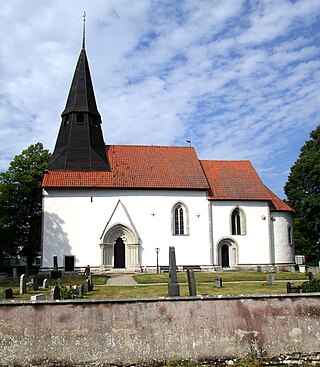
Atlingbo Church is a medieval church in Atlingbo on the Swedish island Gotland. Atlingbo Church was built in stages during the 13th century, with only the sacristy being of later date. The church contains a decorated Romanesque baptismal font made by the workshop or sculptor known as Byzantios. It is used by the Church of Sweden and lies in the Diocese of Visby.

Akebäck Church is a medieval church in Akebäck on the island of Gotland, Sweden. It's a largely Romanesque church and its main construction period was at the end of the 12th century. The church is part of the Diocese of Visby within the Church of Sweden.

Barlingbo Church is a medieval church in Barlingbo on the Swedish island of Gotland. It dates from the 13th century and has been altered little since. It contains furnishings from several centuries, including an unusual medieval baptismal font, decorated with figures and runes. The church belongs to the Church of Sweden and lies in the Diocese of Visby.

Buttle Church is a medieval church in Buttle on the Swedish island of Gotland. It is one of the more well-preserved Romanesque churches on Gotland, and contains both a number of medieval furnishings as well medieval murals. Buttle Church belongs to the Diocese of Visby of the Church of Sweden.

Bäl Church is a medieval church in Gute, Bäl, on the Swedish island of Gotland. It was built during the first half of the 13th century and contains sculptural decoration in both Romanesque and Gothic styles. The interior is decorated by medieval wall paintings. It belongs to the parish of Väskinde, in the Diocese of Visby.
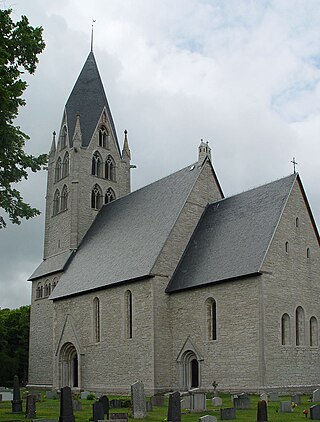
Dalhem Church is a medieval church in Dalhem on the Swedish island of Gotland. Built in the 13th and 14th century, the church underwent major changes during a renovation at the turn of the 19th–20th centuries. Dalhem Church lies in the Diocese of Visby of the Church of Sweden.

Ekeby Church is a medieval church in Ekeby on the Swedish island of Gotland. The oldest parts date from the 12th century, and the church has been little altered since the end of the 13th century. Its interior is richly decorated with medieval murals. It belongs to the Church of Sweden and lies in the Diocese of Visby.
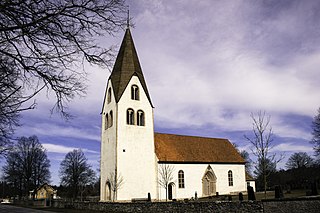
Eksta Church is a medieval church in Eksta on the Swedish island of Gotland, in the Diocese of Visby. The church underwent substantial changes during a restoration in 1838.

Endre Church is a medieval church in Endre on the Swedish island of Gotland, in the Diocese of Visby, built from the 12th to early 14th century. It contains medieval murals and several medieval furnishings, and belongs to the Church of Sweden.
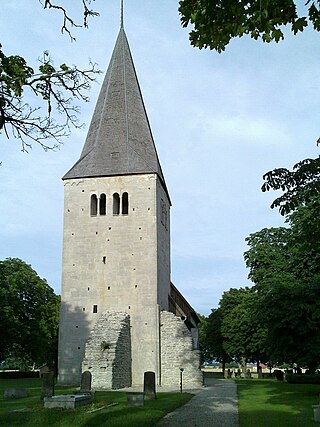
Follingbo Church is a medieval church in Follingbo on the Swedish island of Gotland. Its Romanesque nave and tower are noteworthy for the professionalism with which they were built. It lies in the Diocese of Visby and is used of the Church of Sweden.
References
- ↑ "Gnisvärds kapell" (in Swedish). guteinfo.com. Retrieved 21 October 2014.
- ↑ "Pingstförsamlingen Visby". Pingstförsamlingen Visby. Retrieved 24 June 2020.
- ↑ "Terra Nova kyrkan". Visby domkyrkoförsamling (Cathedral parish of Visby). Church of Sweden . Retrieved 24 June 2020.
- ↑ "Kristi Lekamens församling" [Congregation of the Body of Christ]. Roman Catholic Diocese of Stockholm . Retrieved 24 June 2020.
- ↑ "Vårdklockans kyrka". www.vardklockanskyrka.se (in Swedish). Equimeniakyrkan [Uniting Church in Sweden]. Archived from the original on 6 November 2014. Retrieved 6 November 2014.
Bibliography
- Lagerlöf, Erland, ed. (1973). Gotlands kyrkor (in Swedish). Uddevalla: Rabén & Sjögren. ISBN 9129410355.